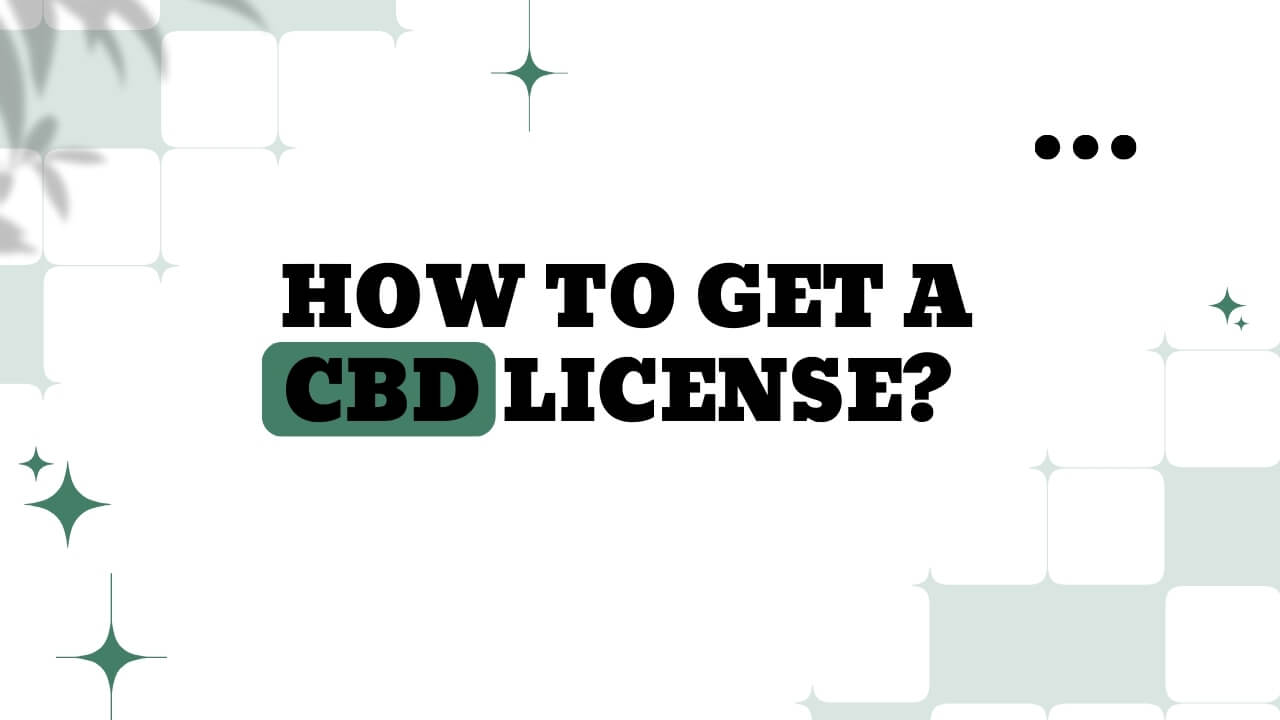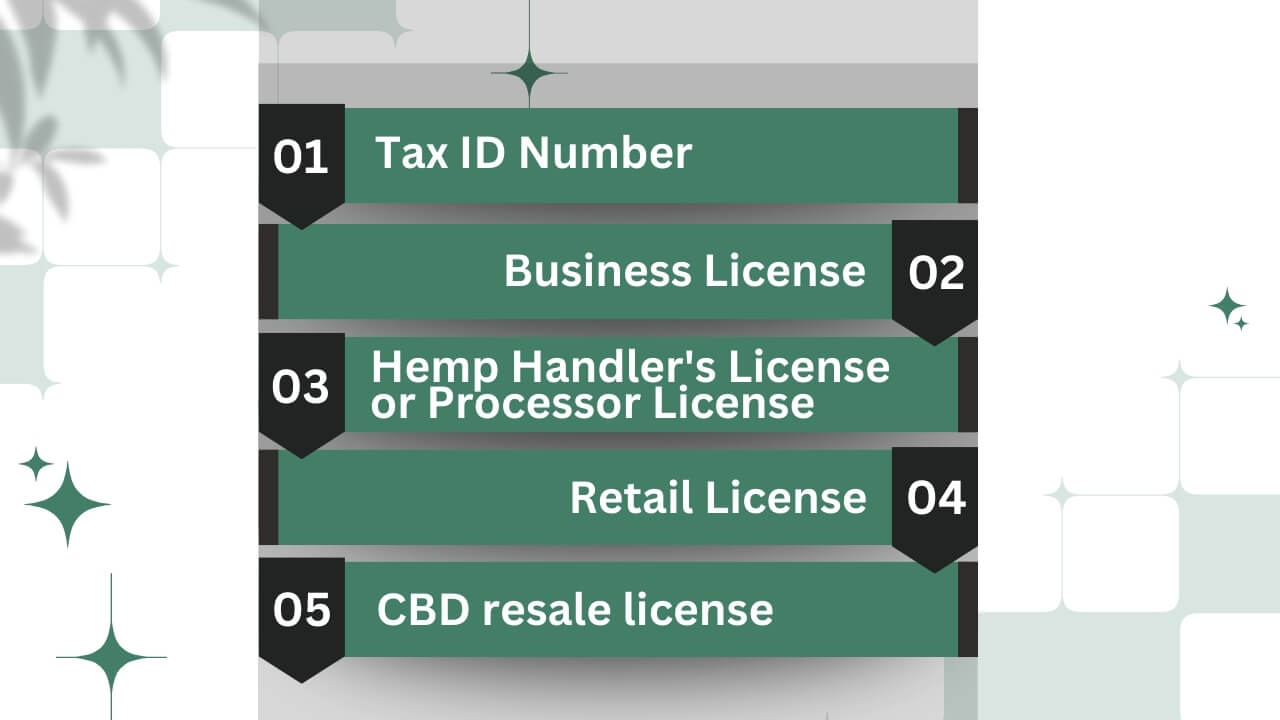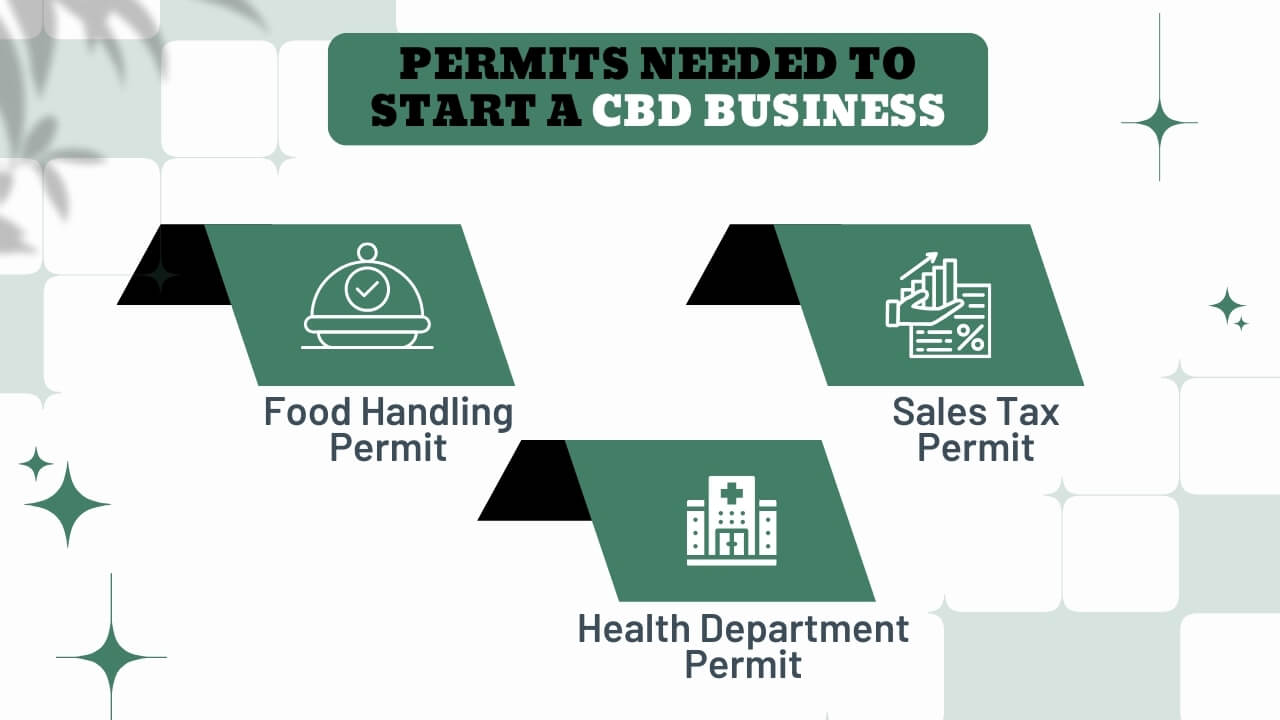
Introduction
CBD products have been increasingly popular in recent years, with people embracing cannabidiol’s purported health advantages. And there is no sign of a slowing down trend: during the next five years, the CBD market is expected to expand at a compound annual growth rate (CAGR) of 21.7%.
Getting a license to sell these products is an essential first step, whether you’re an entrepreneur hoping to make the most of this expanding market or an enthusiastic supporter ready to spread the word about the therapeutic benefits of CBD.
However, it’s not easy to get all the licenses and keep up with the ever-changing compliances. Well, it is possible with this comprehensive guide.
This article covers every aspect of getting a CBD license, including what you need to know to apply for one, how to apply for one, how to renew one, and other regulations your company must meet in order to begin selling CBD products. Now let’s get going!
Also Read: How to Start a CBD Business
What does the current CBD legal landscape look like?
Understanding the legal environment around CBD products is essential before beginning the application process. CBD extracted from hemp plants has very little quantities of THC, the intoxicating component present in marijuana.
In contrast to their marijuana counterparts, hemp-derived CBD products with a THC content of 0.3% or less are now lawful as per the 2018 Farm Bill.
Nonetheless, state laws pertaining to CBD sales differ, so it’s important to become knowledgeable about the particular rules that apply to you. Any hemp-derived products must adhere to the standards outlined in the 2018 Farm Bill. Any non-compliant CBD, like marijuana, heroin, and LSD, is classified as a Schedule 1 substance under federal law.
Furthermore, some jurisdictions have embraced the CBD business, allowing the sale of a diverse range of goods, while others have rigorous restrictions.
Therefore, before beginning the application procedure, it is imperative to do an extensive study to guarantee compliance with local rules and regulations.
Also Read: How to Open CBD Bank Account
Which Licenses & Permits are Required to Start a CBD Business?
While requirements can vary significantly depending on the state and the nature of the business. However, keep reading to find out some general licenses and permits typically needed to start a CBD business.
Licenses Needed for CBD Business:

- Tax ID Number: An Employer Identification Number, or tax ID, helps the Internal Revenue Service (IRS) identify your company for tax-related purposes.
- Business License: In order to run your CBD business, you must have a business license. The license is renewed on a yearly basis and serves as confirmation that your business is legally permitted to operate in the country. Although this license has nothing to do with CBD sales, it is essential for all businesses.
- Hemp Handler’s License or Processor License: If your business involves processing raw hemp into CBD products, many states require a specific license for handling hemp.
- Retail License: A retail license is necessary if you’re selling CBD products directly to consumers, whether through a physical storefront or online. This license is typically issued by the state and may involve compliance with local zoning laws, signage regulations, and other retail-specific requirements.
- CBD resale license: A resale license may also be necessary if you want to buy items from wholesalers or distributors and resell them. Conduct preliminary research to identify the procedures for acquiring a resale license in your state and whether or not you still require one.
Also Read: How much money is needed to Start a CBD Business
Permits Needed to Start a CBD Business:

- Food Handling Permit: For businesses that manufacture or sell consumable CBD products like edibles or beverages, a food handling permit is crucial to ensure that your business adheres to food safety standards.
- Health Department Permit: If your business involves producing or selling CBD-infused foods, dietary supplements, or cosmetics, a health department permit may be required to ensure that your products meet health and safety standards, including proper labeling, manufacturing practices, and storage conditions.
- Sales Tax Permit: A sales tax permit, also known as a seller’s permit, is required for collecting and remitting sales tax on CBD products sold.
It is customary for CBD products to have a THC level of 0.3% or less, and third-party analyses are frequently required for verification. Regulatory agencies may need recorded proof of certain THC concentrations as part of the state’s licensing structure.
Furthermore, the specific area of the CBD market you work in may have an impact on the kind of licenses and permits you require. There may be differences in the license requirements for other areas, such as production, distribution, cultivation, or other ancillary duties.
Also Read: How Much Does it Costs to Open a CBD Dispensary
Some tips to keep in mind before applying for CBD Licenses & Permits!
- Examine the prerequisites: Make sure you are familiar with the licensing criteria in your state before beginning the application process. Do your research because every state has different requirements for documentation and regulations.
- Finish all required documentation: Please take your time completing all necessary forms and sending any necessary supporting paperwork. To ensure the success of your application, you must fill out all of the required information.
- Create a thorough business plan: A well-thought-out business plan is required when applying for a CBD licence. Information about product sourcing, marketing plans, budgetary estimates, and compliance controls should all be included.
- Ensure compliance with quality standards. In the CBD market, quality monitoring is essential. Put in place stringent testing protocols to guarantee that your products fulfill the purity and safety requirements established by authorities.
- Keep accurate records: Maintain thorough records of all business activities, such as lab test results, sales activity, inventory management, and interactions with consumers.
How to Get a CBD License? The State-Wise Guide!
How To Obtain A CBD License in New Jersey?
While manufacturing and selling of hemp and CBD are permitted, New Jersey has stricter testing regulations than many other states. As long as the goods satisfy state requirements, there are essentially no limitations on the kinds that can be produced or sold.
In New Jersey, one needs to register with the NJDA Hemp Program and acquire an industrial hemp license in order to cultivate, produce, or market hemp for CBD or CBD-derived goods.
There are two kinds of licenses available: the Processor/Handler license and the Grower license. In order to apply, people or organizations must submit their personal or company details, property details, and any necessary supporting documentation. There is a non-refundable $50 application fee that must be paid only once.
Also Read: How to Start a CBD Dispensary in California
How to Obtain a New York CBD License?
Hemp and CBD are both legal in New York, and the state has some testing requirements for items made in the state. Other than that, there are no limitations on the kinds of goods that can be produced or distributed.
Businesses who wish to sell cannabis hemp products must get a Cannabinoid Hemp Retail License from the New York Office of Cannabis Management. To sell CBD hemp products in New York, you must first apply for a Cannabidiol Hemp Retail License. You can also easily apply for a license using the New York Business Express website.
This prerequisite is relevant to both in-person and online sales. Distributors must get a Cannabinoid Hemp Distributor Permit before selling or distributing cannabis hemp goods from outside New York State to registered Cannabinoid Hemp Retailers.
Before submitting your application, please examine the Cannabinoid Hemp Retail & Distributor application criteria. The license to sell Cannabinoid Hemp at retail outlets costs $300 per outlet, while the permit to distribute Cannabinoid Hemp costs $300 per distribution location.
Also Read: How to Obtain a Merchant Account
How to Get a License in Texas?
Texas has fascinating CBD legislation that is overseen by the Department of State Health Services. Retailers, for example, are not permitted to sell consumable hemp grown in Texas. Stores may only stock produced goods from outside the state.
Regarding retailers hoping to offer CBD in Texas, there are two different kinds of licenses available:
- Retail Registration for DSHS Hemp: Retailers selling CBD products without making changes to their wholesale items must register with the DSHS. This registration can be completed using an online module. Be prepared to offer information on residences, taxes, and company entity structure. The annual registration price is $155 per location.
- DSHS Consumable Hemp Product Licence: Retailers who repackage or relabel wholesale cannabis products are required to have this license. The process is more complex and time-consuming than the basic Retail Registration.
Aspiring licensees must secure a few key licenses as well:
- A completed Federal Bureau of Investigation Authorization Form.
- A Hemp Property Owner Letter outlining the details of your business.
- A legal description of the property and the precise location of the business using Geographic Information System (GIS) coordinates.
- You will also need to submit your fingerprinting to the Texas Department of Public Safety.
The annual license fee to get a CBD license in texas is $258.
How to Get a License in California?
California has long been a cannabis-friendly state, but the state’s regulations around CBD are especially stringent and ambiguous. The state has not issued a definitive rule on CBD but has proclaimed that it cannot be lawfully added to foods, beverages, animal foods, or nutritional supplements. Hemp agriculture is allowed in the state, and CBD products are still widely available to consumers.
CBD stores can offer items from manufacturers who are formally licensed by the California Department of Public Health.
Nevertheless, there are a few noteworthy restrictions in the realm of California CBD:
- It is forbidden to sell CBD vaporizers or “inhalers.”
- Perishable CBD products may not be sold in restaurants. Every item needs to be “shelf stable and prepackaged.”
To manufacture the CBD products that you sell, you must obtain approval and authorization from the Industrial Hemp Enrollment and Oversight (IHEO).
How to get a CBD License in Colorado?
Colorado is a major hub for the cannabis industry and the state has a clear regulatory framework that ensures the safety and quality of CBD products through strict testing and labeling standards. This system is designed to protect consumers and provide clear guidelines for businesses involved in the cultivation, processing, and sale of CBD products.
- To start a CBD business in Colorado, you first need to register for an Industrial Hemp Registration with the Colorado Department of Agriculture(CDA). You must also pay registration fees and comply with state regulations, including regular THC testing to ensure products meet the legal limit.
- For those manufacturing CBD products, a Manufacturer’s License from the CDPHE is required. This license ensures that your production process meets health and safety standards. You must follow Colorado Department of Public Health and Environment(CDPHE) guidelines, which include regular product testing, accurate labeling, and adherence to safety protocols.
- If you’re selling CBD products directly to consumers, especially edibles, you’ll need a Retail Food Establishment License. This license is issued by local health departments and requires compliance with food safety regulations.
How to Get a CBD License in Florida?
In Florida, starting a CBD business involves navigating a detailed set of rules and regulations. Hemp-derived CBD is legal, but it must have less than 0.3% THC.
- Businesses need to get licenses from the Florida Department of Agriculture and Consumer Services (FDACS)
- Permits from local health departments for cultivation, processing, and selling CBD products.
- Follow strict rules for testing, labeling, and safety.
- Need to register with the Florida Department of State,
- Get a federal Employer Identification Number (EIN),
- Apply for the right licenses from FDACS
You also need to pay the fees, provide detailed information about your business, and make sure your products meet all regulations. It’s important to keep up with any changes in the laws to stay compliant and avoid legal problems.
Renewing and Maintaining Your CBD License.
It’s critical to be informed about renewal requirements and compliance updates as soon as you’ve been issued a CBD license. This will help you stay on top of your registration status and stay out of trouble with the law.
License Renewal Procedures
It is crucial to know when your license expires and to start the renewal process at least one month in advance. This will guarantee a quick and easy transaction. Depending on state legislation and the type of permission necessary, certain requirements must be met while renewing licenses. Prepare the required documents in order to correctly complete the form according to the directions provided by the individual agencies in responsibility across states.
Ongoing Compliance and Regulation Updates
Maintaining your CBD business license’s validity and avoiding any legal issues requires adhering to both federal and state requirements. It is critical to stay current on policy modifications by constantly monitoring your state’s website for changes, subscribing to industry emails, and attending important webinars or seminars.
It will be easier to ensure that you satisfy criteria and effectively manage a profitable business if you are aware of all the changes that occur in this market.
Be transparent about the major changes in your business
It’s important to inform regulatory authorities about any major changes in your CBD business. This includes changes in ownership, location, or business structure. You should also notify them if you introduce new products or alter existing ones.
This keeps your licenses and records up to date and ensures your products comply with all regulations. Keeping authorities informed helps prevent legal issues and shows your commitment to running a transparent business.
To Conclude
Despite these constraints, CBD legalization continues to be a hot topic. Due to varying state regulations and the industry’s perception of high risk, CBD licensing can be complicated. However, by knowing the fundamentals of the process and making informed choices, entrepreneurs can effectively navigate the growing U.S. CBD market and maximize their distribution strategies.
One of the most challenging parts is locating a CBD payment processor. Because of the stigma associated with marijuana-related “high-risk” products, many shops experience disruptions and difficulties.
But, with some research, you will find the reliable one that is curated just for your CBD business and helps you streamline your business transactions.
To make your research a bit easier, you can check out the POS system and payment processor by CBD merchant solutions. We have CBD-compliant, feature-rich payment solutions to make things easy for CBD businesses. If you would like to try it out, you can book a free consultation call and we have got you covered.
Frequently Asked Questions(FAQs)
How much does it cost to get a CBD permit?
The cost associated with obtaining a CBD permission varies greatly based on the jurisdiction. It is probable that certain areas would just require general commercial and resale permits, which could result in several hundred dollar fees. In contrast, in many regions, the cost of obtaining the required permissions is determined by your company’s revenue, thus high-earning companies may have to pay a substantial amount that exceeds tens of thousands of dollars.
How can I start selling CBD products?
To begin selling CBD products, first, extensively investigate and grasp the legal rules in your country governing the sale of CBD. Next, create a thorough business plan that covers everything from locating premium products to securing required licenses and permits to building a powerful internet presence. Finally, prioritize customer education, outstanding service, and adherence to industry standards.
Is it legal to sell CBD without a license?
The ability to sell CBD without a license is determined by the state in which you operate. Before selling CBD goods, most jurisdictions require a business license, but some also call for more comprehensive permits tailored to selling CBD products.
It’s crucial to confirm your state’s regulations before selling CBD products as these licenses can change based on your company’s operations, earnings, and other factors. Similarly, you have to follow the licensing requirements of the states in which you intend to sell goods to customers.
Is it important to get a payment gateway for CBD business?
Yes, obtaining a payment gateway is crucial for your CBD business, especially for online sellers. It allows you to process credit and debit card transactions securely, ensuring a smooth payment experience for customers. Payment gateways also help you stay compliant with industry regulations, protect against fraud, and streamline financial management with tools for tracking and reporting transactions.
What happens if I fail to comply with CBD regulations?
If you don’t follow CBD regulations, there some consequences. It includes paying hefty fines, losing your business license, and even facing legal action. So, it is always important to stay compliant and updated on all the rules and regulations to avoid these issues and ensure smooth operations.
